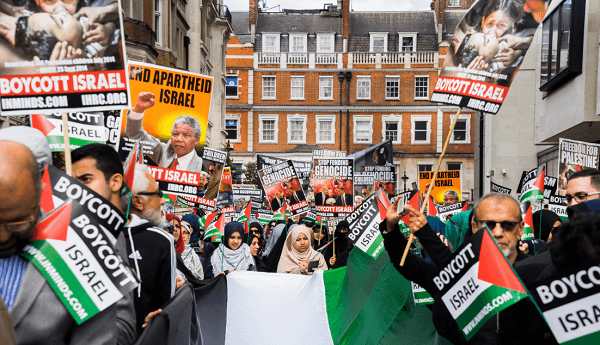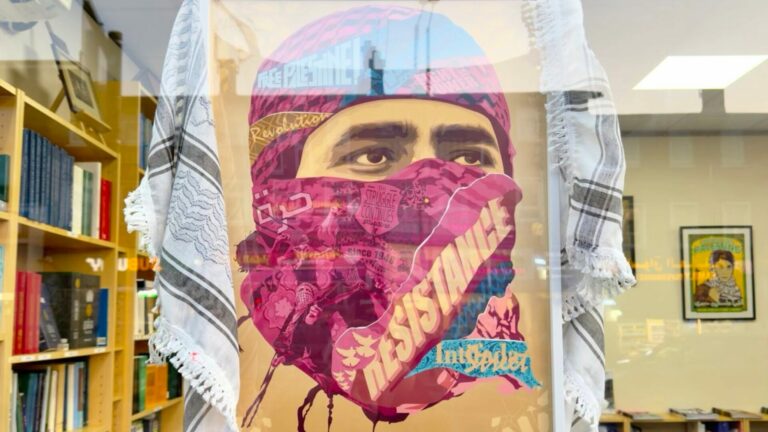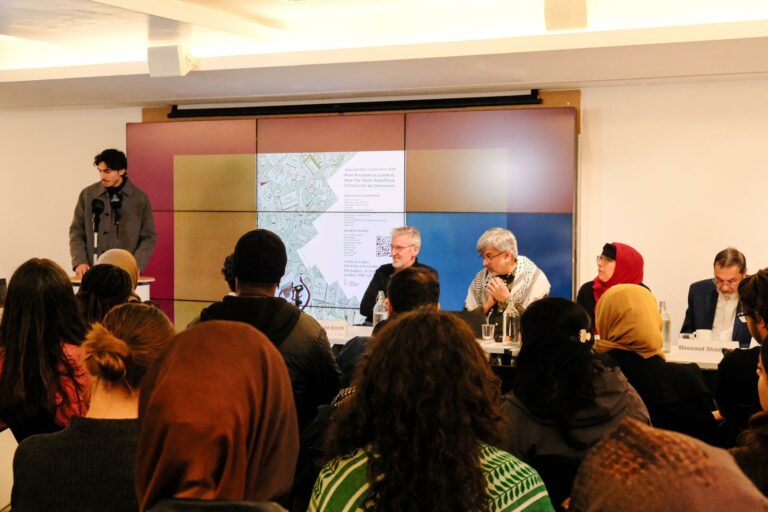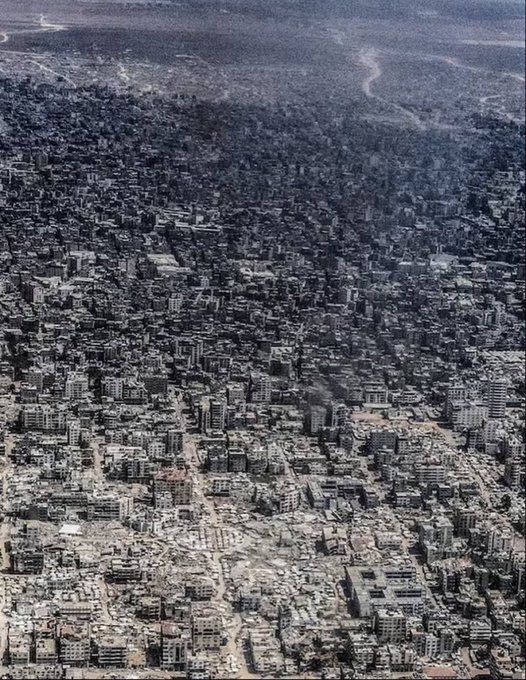Please watch / read through the following to be up-to-date on what powers can and can’t be used against protestors at demonstration in the UK.
Contents
VIDEO: WHAT TO DO IF YOU ARE ARRESTED AT A DEMONSTRATION
Information on this page is from Green & Black Cross
SOLICITORS SPECIALISING IN HUMAN RIGHTS
If you are arrested at a protest, do not use a duty solicitor. These firms can be contacted.
Bindmans 020 7305 5638 / 020 7305 5638
HJA 080 8274 8226
ITN 020 3909 8100
or try the Green & Black Cross Protest Helpline 07946 541 511
BUSTCARDS
Please use Green & Black Cross’ Bustcards. They are available to download. We are reproducing them here.
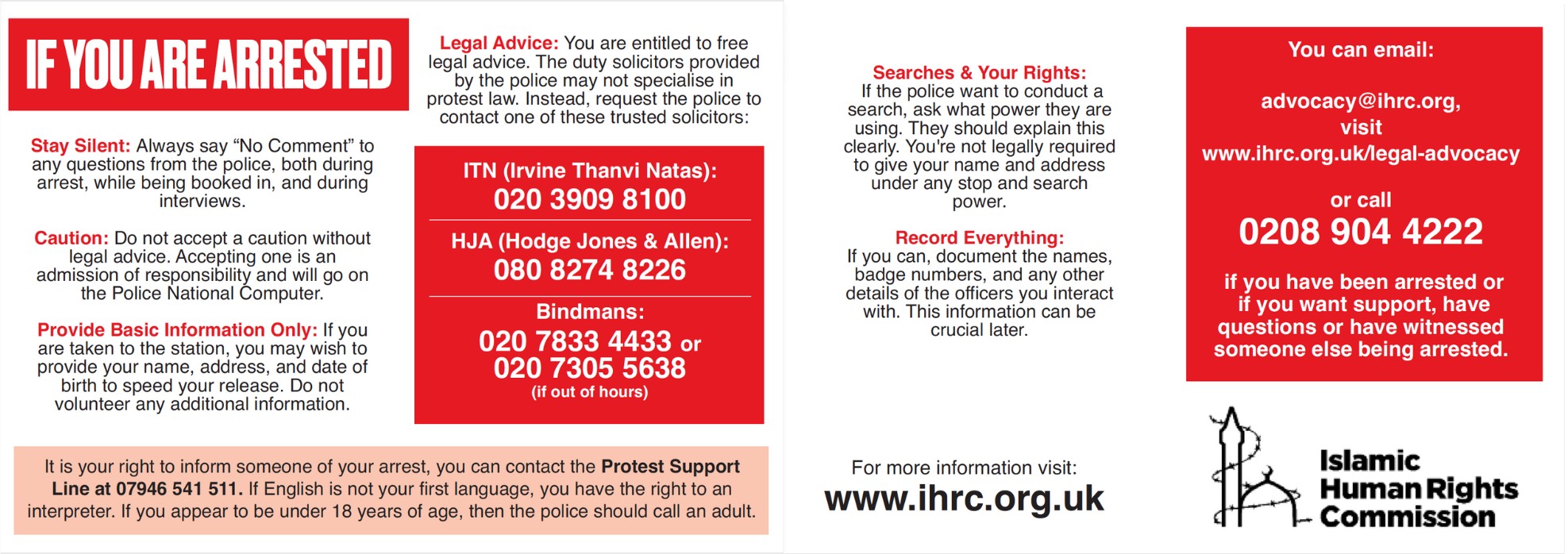
To order physical copies of these cards, please email huseyin@ihrc.org with your address and how many you would like sent to you (we only send out in multiples of 100)
Please find additional information on their site here.
KEY ADVICE WHEN GOING ON A PROTEST
If you’re heading out on a protest, take a read of our key messages and download a copy of our latest bustcard.
We suggest that you take a note of our arrestee support number and of a criminal solicitor with protest experience. Write them down on something the police will struggle to take from you, such as an arm or a leg.
Arrestee Support: 07946 541 511
Use a recommended solicitor with protest experience
Remember these 5
- No Comment
You do not need to answer police questions, so don’t.
- No Personal Details
You don’t have to give details under ANY stop and search power.
- What Power?
Ask “What power?” to challenge a police officer to act lawfully.
- No Caution
They admit guilt for an alleged offence that might never get to court.
- No Duty Solicitor
Use a recommended solicitor with protest experience.
No comment
You do not need to answer police questions, so don’t.
This is for your own protection and for the protection of others.
The police will try to pressure and deceive you into incriminating yourself. Instead of trying to decide when it seems ‘safe’ to answer, just say “No comment” to all questions – during ‘informal chats’, in the police van and especially in interview.
If your friend in the next cell knows you aren’t going to talk, they will feel better able not to talk themselves. Remember, interviews only help the police – they will not interview you if they already have enough evidence to charge you.
There are two main exceptions to this: if you have been arrested and taken to the police station you may wish to give your name, address and date of birth at the custody desk to speed your release.
A good solicitor will sometimes suggest that you make a prepared statement in interview. In that case, you or your solicitor will read the statement and you should answer “No comment” to any more questions.
For a longer discussion, the booklet “NO COMMENT” produced by the Legal Defence and Monitoring Group is excellent (note that it is fairly old and we cannot guarantee that all the content is up-to-date).
No Personal Details
You do not have to give personal details under ANY stop and search power, so don’t.
On protests, the police often use searches as a way of finding out who is present, both for intelligence purposes and to intimidate you.
Police also use arrest as a means of gathering information, particularly when they arrest a large number of people together (“mass arrest”).
You do NOT have to give your personal details to the police at any point during the arrest process.
We recommend not giving personal details to the police for as long as possible – for more information on why, see the page “Do I have to give my details?”
If you have been arrested and taken to the police station you may wish to give your name, address and date of birth at the custody desk to speed your release. Police will usually check the address and may visit at a later date.
Once you reach court, you can be required to give your name, address, date of birth and nationality.
There are a few situations in which police may have a power to require personal details: if someone is driving a vehicle (or another licensed activity); if they are being fined under a Fixed Penalty Notice; under a particular anti-social behaviour power (which should not generally be used against protesters); or if there is a particular by-law (for example, in a port or airport).
What Power?
Ask “What power?” to challenge the police to act lawfully
Some police officers rely on you not knowing the law. If you are asked to do something by a police officer, ask them what power (i.e. what law) they are using and why they are using it. Make a note of what was said, by whom (numbers) as soon as possible afterwards.
Don’t let them turn this into a situation where they ask you questions though – just walk away once you have your answer, and remember No Comment!
The following advice is also from the Green & Black Cross website.
No Caution
Offering you a caution is a way the police may ask you to admit guilt for an offence without having to charge you. It is an easy win for the police, as they don’t have to provide any evidence or convince a court of your guilt.
At the very least, you should never accept a caution without taking advice from a good solicitor.
Cautions are an admission of guilt
It goes on your record
There is no court appearance. You don’t a get the opportunity to explain yourself. You don’t get to argue why you’re not guilty.
Only accept a caution if you have been explicitly advised to do so by a solicitor on the bustcard.
No Duty Solicitor
Use a recommended solicitor with protest experience
The “duty solicitor” is the solicitor who is present at the police station. They may come from any firm of solicitors, which means they almost certainly know nothing about protest.
Duty solicitors often give bad advice to protesters; we recommend you always use a good solicitor who knows about protest.
POWERS TO STOP & SEARCH
On suspicion (Section 10)
Previously, under Section 1 of the Police and Criminal Evidence Act 1984 (PACE), the police had the power to stop and search you for various items, provided that there is reasonable individual suspicion.
The new act now allows the police to also stop and search anyone they reasonably suspect intends to commit any of the new offences brought in by the Public Order Act 2023 and Police Crime Sentencing and Courts Act 2023.
Without suspicion (Section 11)
When a police officer of Inspector rank or above reasonably believes certain offences are going to be committed or objects are being carried in connection with them, including obstructing a highway, public nuisance, and the locking on, tunneling, key infrastructure and obstructing transport work offences from this Act, they can authorise an area within their locality for up to 24h where anyone can be searched for these objects.
This then means that anyone in the area can be searched without there needing to be individually specific grounds to do so. Any items found can be seized and retained. The time period can be extended by 24 hours by a superintendent or higher-ranking officer.
If your person or vehicle is searched you have 12 months to get a written statement that it happened. If you obstruct a search occurring under these powers, the maximum penalty is a Level 3 (£1000) fine, 1 month’s custody or both.
Processions, assemblies and one person protests
Assemblies and one-person protests:
British Transport Police and MoD police (Section 16)
This section extends the power to place section 14 restrictions, such as those on the size and location of a protest, to constables from the British Transport Police and the Ministry of Defence police within their jurisdictions. This could be used, for example, on protests in a train station or outside a military barracks if the land is within the jurisdiction of the MoD police.
- When Can I Be Stopped?
Powers to stop
The police might decide to stop you at any time and ask you questions, such as:
What are you doing?
Why are you in this area?
Where are you heading and where have you been?
You do not have to answer any of these questions. We suggest you don’t, or that you respond with “No Comment”.
This is known as a Stop and Account.
No personal details
You are not required to give your personal details under any Stop and Search power.
Police forces are only required to record 7 items of information collected during a Stop and Search:
- Ethnicity
- Grounds for search
- Object of search
- Identity of police officer
- Date
- Time
- Place
You do not need to assist them by providing any information. We suggest you stay silent.
The following advice is from the Green & Black Cross website.
- When Can I Be Searched?
Powers to search
The law says that you can only be searched if a police officer has a reasonable belief to suspect that you may be carrying something illegal or something that can be used to commit an offence and you are likely to do so.
This forms the grounds of the search.
There are two exceptions to this rule, which are known as blanket search powers:
If a section 60 search power has been granted (Criminal Justice Act).
If a section 47A search power has been granted (Terrorism Act).
- What Can I Be Searched For?
What you can be searched for depends on what search power you have been stopped under.
The police often use a piece of law known as Section 1 of PACE (Police and Criminal Evidence Act 1984).
Using this power, you can be searched for the following item, provided that there is reasonable individual suspicion:
articles for burglary/theft
stolen goods
offensive weapons
bladed articles
items that may be used to commit criminal damage
There are other specific laws that allow an officer to search you. They include the power to search for drugs or explosives, and along with Section 1 PACE, always require reasonable suspicion.
- Whilst not being a search power, if you’re the driver of a vehicle that is being searched or has been involved in a road traffic incident, the police have a specific power to demand your name and address.
- Blanket Search Powers
Blanket search powers give the police the ability to search large groups of people, with no reasonable suspicion.
They are used in public events such as protests, carnivals and sports games, and are put in place by a senior police officer.
There are two blanket search powers that you might come across.
Section 60 of the Criminal Justice Act 1994
This power allows a police officer to search anyone in a specific area for offensive weapons. The order lasts for 24 hours but can be extended.
This power should not be confused with Section 60AA (removing masks).
Section 47A of the Terrorism Act 2000 (Remedial) Order 2011
This power allows a police officer to search anyone where they reasonably suspects that an act of terrorism will take place, and that the power is necessary to prevent it from occurring.
This allows the police to search anyone or anything for the purpose of prevention of terrorism, and replaces the controversial section 44 (TA2000) after it was found to be incompatible with article 8 by the European Convention on Human Rights (ECHR).
- What Is Reasonable Suspicion?
Unless using a blanket search power, before a police officer searches you they need to reasonably suspect that you might be carrying items that can be used to commit an offence.
If an officer has been informed that a person matching your description, and in the local area that you are currently in, has been seen to commit an act of vandalism ie. graffiti, then the police officer can reasonably suspect that the person described may be you.
This allows them to search you for items used to commit criminal damage, in this case spray cans or tins of paint.
- What Happens When I Get Searched?
There is a set procedure that the police must follow when searching people. We can’t guarantee that it will be followed – in fact more often than not we hear from people that officers have appeared to carry out an unlawful stop and search.
The most effective way to hold police officers to account for their actions is by understanding the law that they are using against you.
Police officers must specify before the search:
who they are and
where they are from,
what they are looking for,
why they suspect you, and
search only in places that they might find the items.
You do not have to be actively compliant, and do not need to answer their questions. You may wish to record the search using the Y-STOP app.
If during a search the police find an item that they aren’t looking for, such as a controlled substance (drugs) then they can effectively continue based on the reasonable suspicion that you now are carrying these items.
If you’re in a public space, then the officer can only ask you to remove your outer clothing such as a hat and coat, ask you to empty your pockets, and give you a pat down.
You can be taken into a private area where the search can be continued with the removal of more items of clothing such as jumpers, hoodies and shoes.
A police van is considered a private space.
- What to Look out for When Being Searched
There are a few tricks that officers use to push the boundaries of what is legal when searching people.
It is usual for one officer to search and another to take notes whilst this is going on. Try to focus on what the searching officer is doing, after all, there is no need to respond to the officer asking you questions during the search.
Remember what the police are searching for
If an officer tells you that they are searching for “bladed articles”, then you might expect them to start looking through your wallet for small blades, or bank cards that may have had their corners sharpened. Ok, you probably won’t expect it but it is something that they can do.
If an officer tells you that they have seen someone matching your description, graffiting a slogan on a wall, then what might they be looking for? Perhaps chalk, perhaps a spray can. Both of these items might be found in a pocket, but definitely not a wallet. If the police start looking through your wallet then you should probably question what they are doing.
Protect your personal details
If you have chosen not to give the police any of your personal details, which you are entitled to withhold, then you may not be happy with them reading your private material. If in the course of the search they come across an item with your name on, they may choose to record this as part of a description of you.
To avoid difficult situations, don’t carry any items that can be used to identify you, eg. a driving license or bank card. If you are carrying a phone, lock it! This will prevent officers casually looking through it.
- What Happens If They Find What They Are Looking for?
If the police find an item on you that they suspect may be illegal, they can confiscate it.
At this point they might:
- choose to arrest you on suspicion of possessing an item that may be illegal
- issue you with a fixed penalty notice
- demand your name and address in order to send you a summons at a later date
- A summons is a letter demanding that you attend a police station at a specific time, possibly for a telling off, or to be arrested.
Before attending a police station give us a ring to discuss your options. You might want to attend with a solicitor.
If you refuse to give your name and address for the purpose of a fixed penalty notice or a summons, the police have the power to arrest you in order to determine who you are.
- Seizing an Item
If the police find an item on you that they suspect you may use to commit criminal damage, but isn’t necessarily illegal, then they may seize the item. The item remains yours and you have the right to collect it at a later date.
In order to make it possible to collect your item at a later date, without giving your details:
- ask for a receipt containing a description of the item and ensure it contains a reference number
- make a note of the police station the item is being taken to
- make a note of the date / time, and officer’s number
The searching officer may suggest that they need your name and address in order to guarantee the item gets back to you. This is a tactic used in an attempt to get your name, and you do not need to respond.
The officer is responsible for ensuring that your property is well identified regardless of any information you give them.
- Getting a Receipt
If you’d like to challenge the lawfulness of a stop and search at a later date, you’ll need to find evidence to prove that it took place. This is much easier to do if you get a receipt to prove that it took place and that you were the victim.
You are always entitled to a receipt from a stop and search, but might not always be offered one. Do ask.
The police should make every attempt to provide one immediately unless there is an urgent matter to attend to, in which case they must tell you where you can collect it at a later date.
Police have been known to claim that they are unable to give you a receipt as it will take too long and that they have to finish searching other people first. Do not accept this as it is unlawful.
If you are unhappy with the search procedure, you can later make a complaint. Keep hold of the receipt, it may be useful.
- Phones and Cameras
Mobile phones and tablets contain a lot of information about your personal life that you probably don’t want the police reading.
Police do not have powers to read through or look at images on your phone unless searching you under the Terrorism Act. The most effective way to prevent casual viewing is by using some form of pin lock.
For more information about security on your phone visit Privacy International’s site or download their leaflet ‘Free To Protest: The protestor’s guide to police surveillance and how to avoid it’
Regardless of what power they are using, they cannot demand that you delete any photos from a phone or digital camera.
After an arrest, the police can download information from your mobile phone into their computers. Most operating systems such as Android and iOS have the option of encrypting your device and messaging systems in order to protect your data.
- Removing Masks
If a Section 60AA (Criminal Justice Act 1994) order is in effect, a police officer can demand that any item you are wearing that is mainly used to conceal your identity, is removed. Failure to remove the item can result in an arrest.
The police can seize the item, and you don’t have to be wearing this item at the time for it to be seized.
Section 60 (a blanket search power) and Section 60 AA are different powers, and can be used independently.
[Page originally created 28 May 2019]

